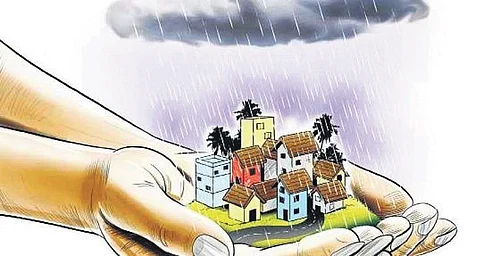

CHENNAI: When it comes to handling and managing water, it’s always been extreme. One year, we were all wading through knee-deep water. A few years later, we were banking on tankers for clean water for every purpose. Are we even treating the resource right?,” asks Dileep Rangan T. That’s precisely what his latest film Drops of Life — Story of Rainwater Harvesting throws light on.
Produced by Big Short Films, the 10-minute documentary breaks down the basics of rainwater harvesting and encourages viewers to embrace the age-old technique. “We launched the film on Independence Day, hoping that would give ample time for people to prepare themselves for the monsoon. But, the recent instances of water-logging shows us that we still have a long way to go,” says Dileep.

Decades of dedication
Besides offering us a reality check, the film features the stories of veterans like ‘Rain Man’ Sekhar Raghavan and Santha Sheela Nair, former IAS officer, who’ve been instrumental in pioneering rainwater harvesting movements across the city. “Around June 2001, I was appointed as the water supply secretary under the late CM J Jayalalithaa. This was the first time a political party had embraced the idea of rainwater harvesting. One of the first problems that worried me was the insufficiency of water and the flood that followed within three-four months. There was a lot of water wastage. The city receives 1,000 mm annually and that’s not a minimal amount. We fought for legislation to make rainwater harvesting mandatory and it became a people’s movement,” recalls Nair.
Now, many homes, organisations and institutions have access to clean water. But aggressive expansion and instant modernisation have led to floods, drought, and practice of unsustainable methods for procuring clean water. Shekar, director of Akash Ganga Trust Rain Centre, reiterates their slogan — Catch rain, it’s free. “Remember, the city has to survive on 54 days of rainfall for the rest of the year. If we don’t harvest it, then the droughts in the coming years will be severe. I’ve been spreading awareness on this technique since 1995 and still many have not understood. The idea is simple — every time it rains, the water falls either on the terrace/rooftop or within the building premises. Conserve the water instead of letting it into the drains,” he suggests.
The documentary also brings unsung heroes under the spotlight. One such couple is Prabha and Harsha Koda, founders of Reign Over Water. They’ve been actively involved in helping set up rainwater harvesting facilities in gated communities. “A drizzle can give 20,000 litres of rainwater, one spell of heavy rain can give 40,000 litres and a storm can give a lakh litres (every hour). It’s a workable and long-lasting model to invest in. We need to tap on this potential,” Harsha points out.
It’s raining solutions
To encourage the youth to participate in building a sustainable ecosystem, organisations like International Centre for Clean Water have been playing a crucial role. Nandakumar E, CEO, shares, “Anybody who has a workable idea of how water works can build a company or model with our help. We are also introducing elective courses for B Tech programmes in Anna University.”
Explaining how the students would be benefitting from the elective course, Ambujam, head of the Centre for Water Resources, Anna University, notes, “Students will learn about the design structures of rainwater harvesting in urban and rural environments. It will give them a holistic perspective on the model and its functions.”
Besides packing a message, the film also reminds us of a solution that’s been in practice for many years. Perhaps, it’s never too late to give it a shot. After all, like Pradeep T, an IIT Madras professor, says in the film, “Water is the basis of everything. The only way we can live is by circulating, and that’s called the hydrological cycle. That cycle is complete only with rain.”
Credits
Big short films
Producer: Amar Ramesh
Director: Dileep Rangan T
Music: Akshay Kumar
Cinematographers: Vinoth RJ, Vivi Raaj, Aravind Naresh, Nishant, Balamurali Krishna
Editing: Aravind Naresh
For queries, visit: raincentre.net, or call ICCW at 9940172451/ 9840680546